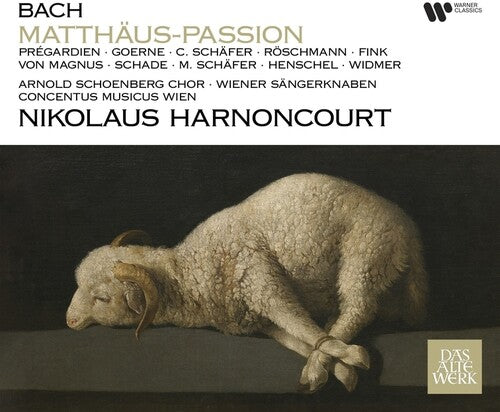Warner Classics
Nikolaus Harnoncourt / Concentus Musicus Wien - St Matthew Passion - Passion Selon St Matthieu (Bach)
Nikolaus Harnoncourt / Concentus Musicus Wien - St Matthew Passion - Passion Selon St Matthieu (Bach)
Usually ships within 1 to 2 weeks.
Couldn't load pickup availability
SKU:WCL502328.2
Share
So much for the seven-year itch. Every 15 years or so Nikolaus Harnoncourt likes to record a new St Matthew Passion ? with the full blessing of his record company (Teldec). His pioneering period performance with Vienna Concentus Musicus and the Choir of King's College, Cambridge, seized the musical world by the scruff of the neck in 1970; a live relay of a concert with the Concertgebouw in Amsterdam was issued in 1986 to raise money for the restoration of their famous hall; and now we have a brand new version with a repopulated Concentus Musicus, the mighty Arnold Schoenberg Choir and an impressive solo cast of established and rising stars. This new recording was made with much love and care over a 12-day period last year in the sumptuous acoustic of the Jesuit Church on Vienna's Ignaz-Seipel-Plaz. With the exception of a few distant traffic noises (annoying for those of us with sub-woofers) the church's genius loci has been gloriously captured, and this distinctive atmosphere adds much to the listening pleasure. But what increased my pleasure most was the technological miracle which allows those listeners with computers to follow the music in perfect sync with a complete facsimile of Bach's beautiful autograph score. (All you need is a disc drive and at least 500 MHz of processor power.) There's even the facility for printing out any page you like, albeit at fairly low resolution. Just one grumble about the production: some idiot editor has inserted pauses between each track on the final disc, regularly and pointlessly interrupting the flow of the music just as the drama reaches it's climax. But what about the performance itself? I must admit that when compared with Harnoncourt's perceptive Bach recordings of the 1960s (particularly the Brandenburg Concertos, the Mass in B minor and the St Matthew Passion), many of his more recent forays into the studios have proved less consistently satisfying. The 1986 Amsterdam recording of the Passion was certainly something of a disappointment, with an unequal solo team and a lack of clarity and precision in both the choral singing and playing. This new recording, though, is in a different class entirely, and should, I think, be enjoyed alongside Harnoncourt's first recording, though it will never entirely replace it. The tone of this new St Matthew may be more satisfyingly extrovert, even theatrical, but the honest liturgical conviction of King's Choir and the measured responses of the 1970s soloists remain extremely persuasive. In the soprano arias few conductors ever managed to elicit such mature singing from boy soloists as Harnoncourt did with the cream of the Vienna Boys' Choir. His grown-up soloists 30 years later offer very different musical insights. Dorothea Röschmann digs deep into her soul for one of the most passionate and urgent renditions on record of ?Blute nur' (Ann Monoyios, for Gardiner, sounds disappointingly pallid in comparison). I also particularly enjoyed the contributions of the full-bodied but perfectly focused contralto Bernarda Fink (magnificent in ?Erbarme dich'); bass Dietrich Henschel is also a joy, and endearingly Fischer-Dieskau-like in ?Komm, süsses Kreuz'. Wobbly baritone Oliver Widmer and over-enthusiastic tenor Michael Schade I can live without. Christoph Prégardien is an experienced Evangelist and is perhaps a shade more lyrical than the more urgently declamatory English Evangelists (Anthony Rolfe Johnson and Ian Bostridge) employed by Gardiner and Herreweghe respectively. But Harnoncourt's choice for Jesus ? Matthias Goerne ? is far and away the most convincing of recent times. On the minus side, the instrumental playing here is not always of the same standard as the singing, and is seldom quite as polished in the accompanied recitatives, ariosos and arias as we get from Gardiner's and Herreweghe's teams. (The rickety solo oboe in ?Ich will bei meinem Jesu wachen' sounds like a throwback to the early days of period performance.) In choral terms, too, the large but well-trained Arnold Schoenberg Choir often fail to capture the mood in quite the same way as the Monteverdi Choir. This is in part the result of their slightly recessed recording perspective, but it's also a matter of interpretation: ?Wo willst du' is hardly quizzical, ?Lass ihn kreuzigen' too well mannered, and ?Wahrlich, dieser ist Gottes Sohn gewesen' is just too ordinary. But the great opening sarabande ?Kommt, ihr Töchter' is a triumph of optimism: infused with the spirit of the dance, it portrays hope and suffering as two sides of the same coin. After 30 years Harnoncourt clearly still has much to say about Bach's masterpiece. This is a recording I'll want to return to often, though probably not as frequently as I will to Gardiner's. Simon Heighes



